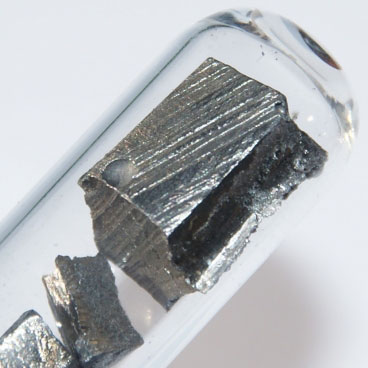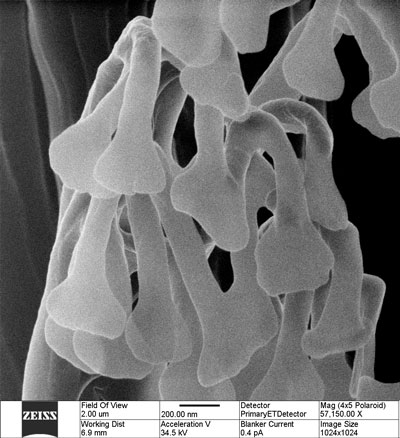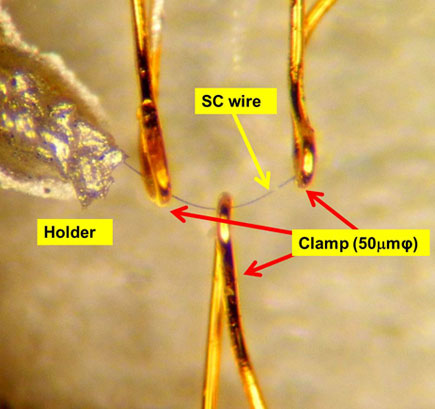Scientists have discovered that when electric current is run through carbon nanotubes, objects nearby heat up while the nanotubes themselves stay cool, like a toaster that burns bread without getting hot.
Apr 9th, 2012
Read more
 A team led by University of Nebraska-Lincoln physicist Alexei Gruverman in collaboration with researchers in Spain and at the University of Wisconsin has discovered a significantly more efficient method of data storage that offers great promise for the future of technology.
A team led by University of Nebraska-Lincoln physicist Alexei Gruverman in collaboration with researchers in Spain and at the University of Wisconsin has discovered a significantly more efficient method of data storage that offers great promise for the future of technology.
Apr 9th, 2012
Read more
Researchers at AIST have developed a new fabrication technology that can lead to low-cost, large-scale, low-voltage driven switchable mirror devices.
Apr 9th, 2012
Read more
 As the world moves toward greater use of low-carbon and zero-carbon energy sources, a possible bottleneck looms, according to a new MIT study: the supply of certain metals needed for key clean-energy technologies.
As the world moves toward greater use of low-carbon and zero-carbon energy sources, a possible bottleneck looms, according to a new MIT study: the supply of certain metals needed for key clean-energy technologies.
Apr 9th, 2012
Read more
Drugs made of protein have shown promise in treating cancer, but they are difficult to deliver because the body usually breaks down proteins before they reach their destination. To get around that obstacle, a team of MIT researchers has developed a new type of nanoparticle that can synthesize proteins on demand. Once these "protein-factory" particles reach their targets, the researchers can turn on protein synthesis by shining ultraviolet light on them.
Apr 9th, 2012
Read more
 Helium ion technology allows imaging of objects in their natural state.
Helium ion technology allows imaging of objects in their natural state.
Apr 6th, 2012
Read more
A team based in the Dept. of Biomedical Engineering at McGill University's Faculty of Medicine has developed a new microfluidics-based microarray that could one day radically change how and when cancer is diagnosed.
Apr 6th, 2012
Read more
Two years ago, researchers at the Massachusetts Institute of Technology (MIT) and the MIT-Harvard Center of Cancer Nanotechnology Excellence (CCNE) demonstrated in animal tests that an implantable microdevice could safely and accurately track a tumor marker in a living animal. Now these same investigators report on the first human clinical trials of an implantable microdevice capable of delivering drugs at the direction of an external wireless controller.
Apr 6th, 2012
Read more
A mixture of current drugs and carbon nanoparticles shows potential to enhance treatment for head and neck cancers, especially when combined with radiation therapy, according to new research conducted by investigators at Rice University and the University of Texas MD Anderson Cancer Center. The therapy uses carbon nanoparticles to encapsulate chemotherapeutic drugs and sequester them until they are delivered to the cancer cells they are meant to kill.
Apr 6th, 2012
Read more
Researchers at Harvard University have developed a robotic device made from DNA that potentially could seek out specific cell targets within a complex mixture of cell types and deliver important molecular instructions, such as telling cancer cells to self-destruct. Inspired by the mechanics of the body's own immune system, the technology might one day be used to program immune responses to treat various diseases.
Apr 6th, 2012
Read more
Researchers at Wake Forest Baptist Medical Center have shown that multi-walled carbon nanotubes injected into breast tumors and irradiated with a quick, 30-second laser beam, are effective at killing breast cancer stem cells.
Apr 6th, 2012
Read more
Nanothermal therapy - the use of nanoparticles to cook a tumor to death - is one of the many promising uses of nanotechnology to both improve the effectiveness of cancer therapy and reduce its side effects. Now, a team of investigators from the Texas Center for Cancer Nanomedicine has shown that liver cancer cells will take up targeted gold nanoparticles, absorb radio waves, and generate heat that damages the cells.
Apr 6th, 2012
Read more
A nanoparticle drug delivery vehicle for small interfering RNA molecules (siRNA), that is already being tested in human clinical trials, now shows promise for the treatment of head and neck cancer.
Apr 6th, 2012
Read more
With the aid of a novel set of lipid-coated, targeted quantum dots, researchers at Johns Hopkins University have developed a method for quantifying multiple specific biomarkers on the surfaces of individual cancer cells. This approach to quantitative biomarker detection stands to improve the histopathology methods used to diagnosis pancreatic and other cancers and enable the development of methods to spot cancer cells circulating in the blood stream.
Apr 6th, 2012
Read more
Nanotechnology offers powerful new possibilities for targeted cancer therapies, but the design challenges are many. Northwestern University scientists now are the first to develop a simple but specialized nanoparticle that can deliver a drug directly to a cancer cell's nucleus -- an important feature for effective treatment.
Apr 5th, 2012
Read more
 Researchers succeeded in the development of strong, tough high temperature superconducting nanowires.
Researchers succeeded in the development of strong, tough high temperature superconducting nanowires.
Apr 5th, 2012
Read more





 Subscribe to our Nanotechnology News feed
Subscribe to our Nanotechnology News feed